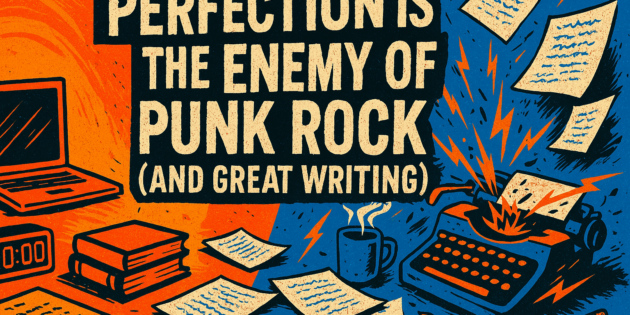If you were around in the late 1990s, you might remember the chaos that erupted when George Lucas released the Star Wars Special Editions.
Fans were furious.
“Han shot first!” became a rallying cry.
For many of us who grew up loving Star Wars, these “updates” felt like sacrilege.
The original films were already “perfect” in our eyes. They were raw, magical, and just right the way they were.
But Lucas didn’t think so.
From the artist’s perspective, the work was incomplete. Not good enough. And that impulse (to keep fixing, tweaking, and “perfecting”) is one that plagues many creatives, especially writers.
And here’s the truth: It’s almost never a good idea.
Perfectionism Doesn’t Lead to Power
Over the past two decades, in my job as a writing coach I’ve worked with everyone from federal bureaucrats to high-level corporate executives. I’ve ghostwritten books for top business leaders and sat in boardrooms where decisions worth millions were made. And you know what I’ve noticed?
The people who proudly call themselves ‘perfectionists’?
They’re never the ones in charge.
Executives don’t claim perfectionism as a badge of honour. Why? Because chasing perfection is wildly inefficient.
Getting something from 95% to 95.5% might burn hours of time, energy, and budget. Talk about a terrible ROI!
Leaders know when to stop fiddling and ship the work.
Hell, even the film Trainspotting makes fun of perfectionism.
In one scene, a character intentionally tanks a job interview by calling himself ‘a perfectionist’. It’s hilarious because he’s clearly not one, but also because calling yourself a perfectionist is exactly the kind of thing that won’t get you hired.
The Beauty of Rough Edges
Rough edges aren’t just acceptable—they’re sometimes preferable.
I’ve written about this before in the context of punk rock.
Punk rock doesn’t care about perfect. Punk rock cares about passion. Punk cares about desperation.
And desperation? Desperation can be beautiful.
The other night, I found myself deep in a YouTube rabbit hole. I watched Les Claypool of Primus cover “Holiday in Cambodia” by The Dead Kennedys.
Then I saw the Foo Fighters team up with the lead singer of System of a Down to cover the same track.
Now, these are some of the best musicians in the world. Technically brilliant. World-class performers.
And yet… neither cover even came close to capturing the unforgettable electricity of the original 1980s Dead Kennedys version recorded by a group of scrappy 20-something punks with cheap gear and a whole lot of rage.
Why? The Desperation’s Gone
In 1997, NOFX released a song called “The Desperation’s Gone.” It was a critique of the state of punk at the time—when bands like Green Day and The Offspring had gone mainstream, and the raw energy of the genre was being diluted for the masses.
“The notes and chords sound similar,
The same forbidden beat, but…
The desperation’s gone.”
Those lyrics nail it. The structure of “Holiday in Cambodia” was the same. The beat was the same. But the feeling? Gone.
Desperation is what drives punk rock. It’s what fuels innovation, energy, risk, and authenticity.
It’s also what makes your story matter.
And it’s something that’s lost the moment you try to sand off all the rough edges in search of some mythical “perfect draft.”
Writers, Be Desperate
If you’re one of those writers who proudly identifies as a perfectionist, I want to challenge you.
Stop chasing perfection.
Start chasing desperation.
Write like it matters. Like it has to be said. Like you don’t know if you’ll get another chance.
What are you hungry for?
What’s burning inside you that the world needs to hear?
How can your story grab your reader by the collar and make them feel something?
Steven Pressfield once wrote, “Write your first draft like the devil is behind you.” He wasn’t talking about perfection. He was talking about urgency. Hunger. Fire. Desperation.
Forget about polishing your prose to oblivion. Instead, get raw. Get emotional. Get real.
Because what your reader needs isn’t your perfect sentence…
It’s your truth.
—
Kevin T. Johns is a punk rock-loving writing coach who helps authors ditch perfectionism, embrace their creative fire, and write stories that actually matter. Get his checklist for turning ordinary scenes into literary gold:







